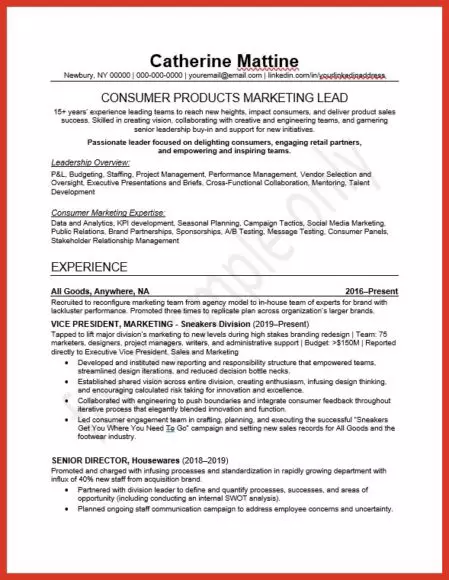How to write a resumÃĐ with a lot of professional experience
By Elizabeth Exline
In a world where there are entire television series built around the concept of "bling," and where success is measured in cars and handbags, it can feel ironic to say you have too much of, well, anything. But when it comes to work experience and resumÃĐs, you actually can. Hereâs how to successfullyĖýwrite a resumÃĐĖýwhen you have extensive work experience, from tailoring your employment history to counteracting the forces of ageism in the marketplace.
Caution ahead!
Click on the image to download our
experienced graduate resumÃĐ sample.
Having a lot of work experience usually means one of two things. Either you have been working a long time, in which case you face potential discrimination because of your age, or you have held a series of short-term jobs. Both situations require some dexterity in how you handle them.
For those who have more than 15 years of experience, be aware that overqualification is a thing. According to Ricklyn Woods, a career advisor at °ÄÃÅĖėĖėēĘŋŠ―ąžĮž (UOPX), recruiters or hiring managers may dismiss people with a lot of work experience because they assume that their salary requirements will be too high or that they wonât be satisfied in the role.
To bypass this problem, donât lead with how many years of experience you have. In fact, if you have more than 10 or 15 years of work experience, you might choose to omit the dates for earlier experience altogether.
Instead, use dates for the past 15 years of experience, then add a section titled "Additional Experience" for any job you had more than 15 years ago. There, you can include the job title, company name and a brief description of each role but without the dates.
By focusing on your skills and experience, you set the tone for what the recruiter or hiring manager should be considering: your value.
As for candidates with multiple short-term jobs, the solution is all about tailoring. (Keep reading!)
Get focused
Woods has worked in human resources for more than 15 years and coached private clients for three years before joining UOPX. All of this is simply another way of saying sheâs seen it all. And she says the No.1 mistake experienced job candidates make is writing a resumÃĐ thatâs too long. Like four, five or six pages too long.
As a best practice, the resumÃĐ should be no longer than two pages. It should also be tailored to the job opportunity youâre pursuing.
That said, sometimes knowing what you want is the hardest part of a job search. If your experience is widely varied, Woods points out, itâs hard to know what to apply for.
"The search is not very strategic if youâre casting a wide net," she says.
An MBA, for example, makes a wonderful first step toward a variety of careers. Deciding which path to take requires a certain level of self-awareness and introspection.
Woods, for example, recalls speaking to one alumnus who had earned his MBA but had no idea what he wanted to do next in his career. So, Woods began drilling down on his interests and aptitude. This wasnât a "What are your hobbies?" sort of Q&A session, but a focused coaching session that asked the alumnus to identify which tasks or projects he enjoyed most during his day-to-day job as well as which areas he excelled in.
"As you get clear about what you enjoy doing and what youâre good at, that can help you narrow your focus," Woods explains.
That clarity can also help you interview better and write a more effective cover letter. Yes, cover letters are still necessary, Woods says, and they should include bullet points that highlight your job-specific skills and the value you bring. The introductory and closing paragraphs, meanwhile, are opportunities to convey your (sparkling) personality and demonstrate that youâve researched the company to which youâre applying.
Edit freely
After you figure out what job youâre going for, itâs time to write or update that resumÃĐ. Your best starting point? The position in question.
"The job description that youâre applying for is literally the answer to the test," Woods explains.
To create your summary, youâll need to highlight your skills and experience. It helps if you can add in some of the keywords or skills specifically mentioned in the job description. If you have a sentence or two where you list your skills, you can swap them out depending on the role youâre applying for. This allows for a degree of customization without having to rewrite the section every time.
From there, Woods advises going through each bullet point on the description and treating it as a question. Consider when you have accomplished each of the asks. Also, pay particular attention to the first three or four bullet points in the description. These are often essential functions of the position. The bullet points on your resumÃĐ should describe your relevant experience as closely to those bullet points as possible.
And, in case you were wondering, bullet points are a must. A short paragraph is fine for the summary, but make sure your resumÃĐ is easy to skim.
Process of elimination
While a job posting can offer a good idea of what to include, it can offer just as much insight on what to leave out. When you have an abundance of experience, Woods generally recommends using your resumÃĐ real estate wisely and emphasizing that which directly aligns with or transfers to the job at hand.
For example, Woods once worked with a client whose resumÃĐ said she was good at navigating Facebook and TikTok.
Woods recalls: "I said, âThat may be great, but if itâs not in the job description, it may be a distraction.â If youâre applying to be a social-media manager, OK. But if not, it doesnât apply."
Also consider which jobs reflect the right or the most transferrable skills. A job in administrative support, for example, may not seem like it aligns with a supply-chain position, but as Woods saw with one client, there can be some crossover skills. Woodsâ client, for example, realized she did in fact have experience creating strategic plans. She just referred to them as "plans of action" in her old job.
Ultimately, you have to think about your resumÃĐ from a big-picture perspective. "If it doesnât make your career story sound compelling, then I would recommend leaving it off," Woods summarizes.
Age? Itâs nothing but a number
Having ample work experience offers many benefits, but one of the biggest challenges (outside of fitting it onto a resumÃĐ) is facing down ageism in the workplace. And while leaving off graduation and employment dates can help keep the focus on your skills rather than your upcoming birthday, it might be more advantageous to seek out opportunities that actively reward your skills and experience.
Woods points out that the language of a posting can hint at ageism. The phrase "high energy," for instance, suggests the employer is looking for younger candidates.
Mature candidates, on the other hand, can explore their own tailored opportunities. Woods says dedicated job boards like that of can help experienced job seekers focus their efforts on prospects that align with where they are in life and in their career goals.
There should be some benefits to having all that experience, after all. And choice about what comes next in your career is as good as any.
Need a little guidance on crafting a cover letter? Check out our blog!
Everyone can learn something new. Give your resumÃĐ an edge with our skills-based, noncredit courses.
Ėý
want to read more like this?




